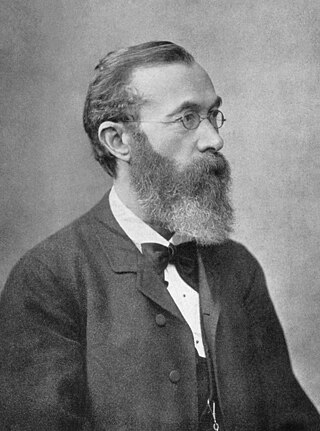
Wilhelm Maximilian Wundt was a German physiologist, philosopher, and professor, one of the fathers of modern psychology. Wundt, who distinguished psychology as a science from philosophy and biology, was the first person to call himself a psychologist.
Gestalt psychology, gestaltism, or configurationism is a school of psychology and a theory of perception that emphasises the processing of entire patterns and configurations, and not merely individual components. It emerged in the early twentieth century in Austria and Germany as a rejection of basic principles of Wilhelm Wundt's and Edward Titchener's elementalist and structuralist psychology.

Franz Clemens Honoratus Hermann Josef Brentano was a German philosopher and psychologist. His 1874 Psychology from an Empirical Standpoint, considered his magnum opus, is credited with having reintroduced the medieval scholastic concept of intentionality into contemporary philosophy.

Max Wertheimer was a psychologist who was one of the three founders of Gestalt psychology, along with Kurt Koffka and Wolfgang Köhler. He is known for his book, Productive Thinking, and for conceiving the phi phenomenon as part of his work in Gestalt psychology.
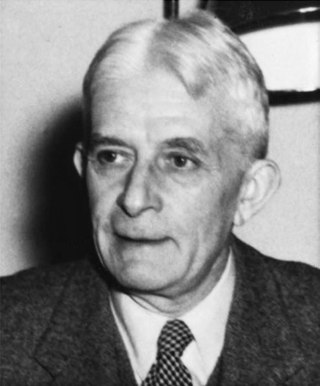
Wolfgang Köhler was a German psychologist and phenomenologist who, like Max Wertheimer and Kurt Koffka, contributed to the creation of Gestalt psychology.
Gestalt Theoretical Psychotherapy(GTP) is a method of psychotherapy based strictly on Gestalt psychology. Its origins go back to the 1920s when Gestalt psychology founder Max Wertheimer, Kurt Lewin and their colleagues and students started to apply the holistic and systems theoretical Gestalt psychology concepts in the field of psychopathology and clinical psychology. Through holism, "a person's thinking, feeling, actions, perceptions, attitudes and logical operations" are seen as one unity. Many developments in psychotherapy in the following decades drew from these early beginnings, like e.g. group psychoanalysis (S. Foulkes), Gestalt therapy (Laura Perls, Fritz Perls, Goodman, and others), or Katathym-imaginative Psychotherapy (Hanscarl Leuner).
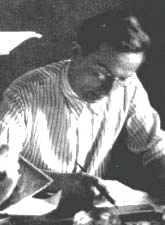
Rudolf Arnheim was a German-born writer, art and film theorist, and perceptual psychologist. He learned Gestalt psychology from studying under Max Wertheimer and Wolfgang Köhler at the University of Berlin and applied it to art.
The Berlin School of Experimental Psychology was founded by Carl Stumpf, a pupil of Franz Brentano and Hermann Lotze and a professor at the University of Berlin, in 1893. It adhered to the method of experimental phenomenology, which understood it as the science of phenomena. It is also noted as the originator of Gestalt psychology. Noted members include Max Wertheimer, Kurt Koffka, and Wolfgang Köhler.

Kurt Goldstein was a German neurologist and psychiatrist who created a holistic theory of the organism. Educated in medicine, Goldstein studied under Carl Wernicke and Ludwig Edinger where he focused on neurology and psychiatry. His clinical work helped inspire the establishment of The Institute for Research into the Consequences of Brain Injuries. Goldstein was forced to leave Germany when Hitler came to power because of his Jewish heritage. After being displaced, Goldstein wrote The Organism (1934). This focused on patients with psychological disorders, particularly cases of schizophrenia and war trauma, and the ability of their bodies to readjust to substantial losses in central control. His holistic approach to the human organism produced the principle of self actualization, defined as the driving force that maximizes and determines the path of an individual. Later, his principle influenced Abraham Maslow's hierarchy of needs. He was the co-editor of Journal of Humanistic Psychology.
Hans G Helms was a German experimental writer, composer, and social and economic analyst and critic.
Johannes Karl Holzamer was a German philosopher, pedagogue and former director general of the German television station ZDF.
Karl Duncker was a German Gestalt psychologist. He attended Friedrich-Wilhelms-University from 1923 to 1923, and spent 1925–1926 at Clark University in Worcester, MA as a visiting professor, where he received a master's degree in arts degree. Until 1935 he was a student and assistant of the founders of Gestalt psychology in Berlin: Max Wertheimer, Wolfgang Köhler and Kurt Koffka. In 1935, exiled by the Nazis, he got an assistantship in Cambridge with Frederic Charles Bartlett and later immigrated to the US, where he was again an assistant of Wolfgang Köhler's at Swarthmore College. Duncker committed suicide in 1940 at 37 years of age. He suffered from depression for some time and had received professional treatment.

Helmut Müller-Enbergs is a German political scientist who has written extensively on the Stasi and related aspects of the German Democratic Republic's history.

Mary Henle was an American psychologist who's known most notably for her contributions to Gestalt Psychology and for her involvement in the American Psychological Association. Henle also taught at the New School of Social Research in New York; she was involved in the writing of eight book publications and also helped develop the first psychology laboratory manual in 1948 based on the famous works of Kurt Lewin.
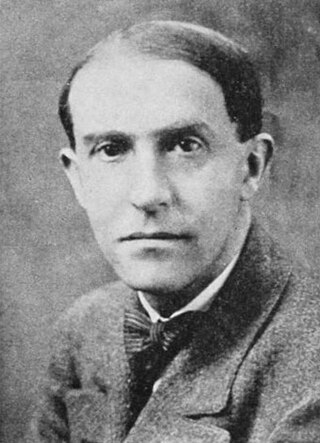
Kurt Koffka was a German psychologist and professor. He was born and educated in Berlin, Germany; he died in Northampton, Massachusetts, from coronary thrombosis. He was influenced by his maternal uncle, a biologist, to pursue science. He had many interests including visual perception, brain damage, sound localization, developmental psychology, and experimental psychology. He worked alongside Max Wertheimer and Wolfgang Köhler to develop Gestalt psychology. Koffka had several publications including "The Growth of the Mind: An Introduction to Child Psychology" (1924) and "The Principles of Gestalt Psychology" (1935) which elaborated on his research.
Helga de la Motte-Haber is a German musicologist focusing on the study of systematic musicology.

Gabriele von Wartensleben was a German psychologist who published the first academic statement on Gestalt theory. She additionally was the first woman to receive a PhD in psychology from University of Vienna through an honorary degree.
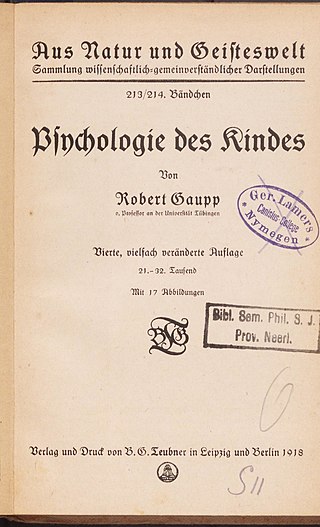
Psychologie des Kindes is a book written by the German psychiatrist and neurologist Robert Gaupp. It was first published in 1907 by the publishing house B.G. Teubner Leipzig Berlin. There were a total of four versions of the book, the last revised version appearing in print in 1917.

Wilfried Gruhn is a German music educator, musicologist, violinist, and professor emeritus at universities in Germany and abroad. His focus is the music education of small children. He founded and directed the Gordon Institute of early childhood music learning in Freiburg in 2003. He is engaged in several international organisations such as International Society for Music Education (ISME) and the Internationale Leo Kestenberg Gesellschaft which published Leo Kestenberg's complete writings in six volumes.
Friedrich Otto Karl Möbius was a German art historian and architectural historian. From 1976 to 1991, he was the full professor of art history at the Friedrich-Schiller-Universität Jena.











